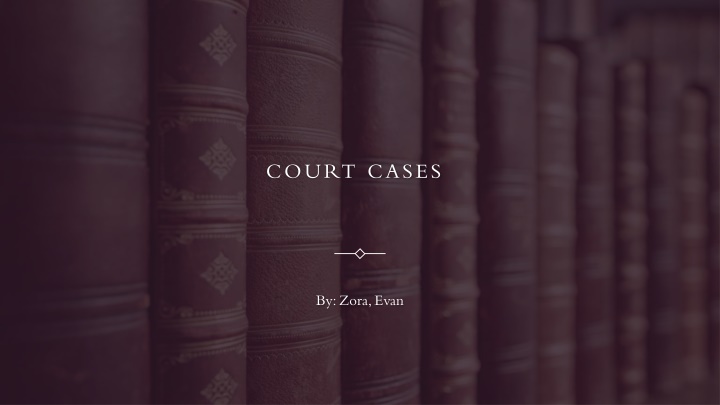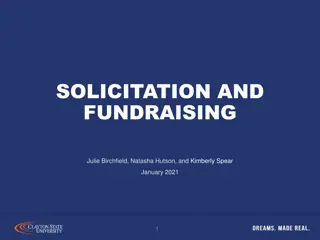Landmark Court Cases: Bostock v. Clayton County & Buck v. Bell
Landmark court cases discussed here are Bostock v. Clayton County focused on workplace discrimination against LGBT individuals and the impact of Title VII protections, and Buck v. Bell which legitimized eugenic sterilization laws. Bostock case resulted in extending Title VII protections to cover sexual orientation and gender identity, while Buck v. Bell led to the widespread adoption of sterilization laws in the US.
Download Presentation

Please find below an Image/Link to download the presentation.
The content on the website is provided AS IS for your information and personal use only. It may not be sold, licensed, or shared on other websites without obtaining consent from the author.If you encounter any issues during the download, it is possible that the publisher has removed the file from their server.
You are allowed to download the files provided on this website for personal or commercial use, subject to the condition that they are used lawfully. All files are the property of their respective owners.
The content on the website is provided AS IS for your information and personal use only. It may not be sold, licensed, or shared on other websites without obtaining consent from the author.
E N D
Presentation Transcript
COURT CASES By: Zora, Evan
Bostock v. Clayton County Case Background Information: Gerald Bostock was an employee of Clayton County, within theAtlanta metropolitan area, as an official for its juvenile court system since 2003, with good performance records through the years. In early 2013, he joined a gay softball league and promoted it at work for volunteerism. In April 2013, Clayton County conducted an audit of funds controlled by Bostock and fired him for "conduct unbecoming a county employee". Georgia had no law protecting LGBT people from employment discrimination at the time. Bostock believed that the county used the claim of misspent funds as a pretext for firing him for being gay and sought legal recourse for workplace discrimination in 2016 in the United States District Court for the Northern District of Georgia. The county sought to dismiss the claim of prohibited discrimination the District Court agreed to dismiss, based on the precedent established in the 2017 case Evans v. Georgia Regional Hospital decided by the Eleventh Circuit , which held that the Civil Rights Act's Title VII does not include protection against discrimination towards sexual orientation.
The outcome Justice Neil Gorsuch delivered the opinion of the Court in this case on June 15, 2020.In a 6 3 decision, the Court held that Title VII protections pursuant to 2000e-2(a)(1) did extend to cover sexual orientation and gender identity. The decision then involved the statutory interpretation of Title VII (specifically the original meaning of "sex"),not constitutional law as in other recent landmark cases involving the rights of LGBT individuals such as Obergefell v. Hodges.The Court further held that Title VII protections against sex discrimination in the employment context apply to discrimination against individuals based on sex, as opposed to discrimination against groups.Thus, Title VII provides a remedy to individuals who experience discrimination based on sex even if an employer's policy overall does not involve discrimination.
Buck v. Bell The concept of eugenics was propounded in 1883 by Francis Galton, who also coined the name. The idea first became popular in the United States and had found proponents in Europe by the start of the 20th century; 42 of the 58 research papers presented at the First International Congress of Eugenics, held in London in 1912, were from American scientists. Indiana passed the first eugenic sterilization statute in 1907, but it was legally flawed. To remedy that situation, Harry Laughlin, of the Eugenics Record Office (ERO) at the Cold Spring Harbor Laboratory, designed a model eugenic law that was reviewed by legal experts. In 1924, the Commonwealth of Virginia adopted a statute authorizing the compulsory sterilization of the intellectually disabled for the purpose of eugenics, a statute closely based on Laughlin's model.
The outcome The effect of Buck v. Bell was to legitimize eugenic sterilization laws in the United States as a whole. While many states already had sterilization laws on their books, their use was erratic and effects practically non-existent in every state except for California. After Buck v. Bell, dozens of states added new sterilization statutes, or updated their constitutionally non-functional ones already enacted, with statutes which more closely mirrored the Virginia statute upheld by the Court.
Stuff used Wakida Bing images























